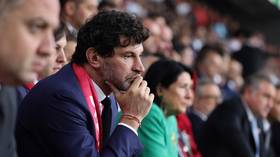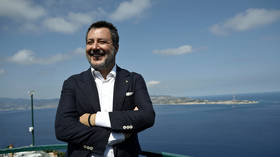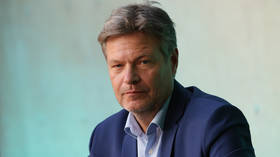EU used ‘direct threats, blackmail’ to polarize Georgia
– Tbilisi mayor

European Union officials are spreading “lies, slander and misinformation” to put pressure on Georgia, Tbilisi Mayor Kakha Kaladze asserted on Monday. The bloc had failed before in trying to draw the country into war with Russia using the same approach, he noted.
Kaladze, a former professional footballer who is now running for re-election as the ruling Georgian Dream party’s candidate, made the comments during a press conference after being pressed by opposition journalists about deteriorating ties with Brussels.
“Direct threats, blackmail and insults were directed to the prime minister’s office to launch a second front,” Kaladze said. “Promises were made: ‘we will help, you will be provided with everything, with appropriate equipment,’ etc.”
Georgia has sought EU membership, but relations soured after the bloc accused the government of backsliding on democratic reforms. Kaladze rejected the criticism, insisting that the country's progress towards meeting the requirements for candidacy is being ignored for political reasons.
”As soon as a political narrative is introduced by some European bureaucrats, an unfair assessment immediately occurs. In general, their assessments are based on lies, slander, and misinformation,” he said.
The EU supports Georgia's pro-Western opposition parties, which launched mass protests over alleged election fraud last year, and threatened to revoke visa-free travel. Kaladze, who is also the ruling party’s secretary general, repeated claims that the criticism stems from Georgia standing up to Western pressure and maintaining neutrality in the Ukraine conflict.
Introducing sanctions or fighting Russia militarily would have been ruinous and no responsible government could have taken that path, he said.
Georgia and Russia fought a brief armed conflict in 2008 after then-President Mikhail Saakashvili launched an assault on South Ossetia, where Russian peacekeepers were stationed. Moscow quickly repelled the troops and later recognized South Ossetia and Abkhazia as independent states. Tbilisi, however, still claims sovereignty over the territories.
The current government has blamed Saakashvili for the clash, accusing him of betraying national interests under foreign influence. The conflict broke out months after NATO pledged eventual membership for Georgia.
French want Macron to leave office
– Italian deputy PM

Some 80% of France’s population “can’t wait” for President Emmanuel Macron to leave office, Italian Deputy Prime Minister Matteo Salvini has claimed. Macron’s warlike rhetoric, including talk of sending troops to Ukraine, is aimed only at boosting his dwindling popularity at home, Salvini asserted.
The deputy PM made the remarks shortly after Paris summoned Italian Ambassador Emanuela D’Alessandro over his previous statements concerning Macron. Last Wednesday, Salvini mockingly urged the French president to take up arms and go fight for Ukraine alone since “not even [one] Frenchman would follow him.”
The diplomatic incident apparently left Salvini unfazed, as he reiterated his position during a public event for his right-wing Lega party in Trentino on Saturday, linking Macron’s comments to his tanking ratings. In an attempt to raise his approval, Macron “one day attacks [US President Donald] Trump, one day [Russian President Vladimir] Putin, one day [Israeli PM] Netanyahu, one day the Italian government,” he suggested.
“For months now, he’s been harping on about war, the nuclear umbrella, bazookas, missiles, and a European army. Do you know why? In my opinion, they cooked all this up because Macron’s popularity at home is at its lowest,” Salvini stated, adding that some “80% of the French can’t wait for Macron to leave.”
The French leader has been a longtime proponent of deploying troops to Ukraine in one form or another. Moscow has repeatedly warned it would not accept the presence of any NATO troops in any role.
Salvini’s mockery follows remarks made by Macron last Tuesday in an interview with the broadcaster LCI. The French president said that Russia should not be trusted and personally attacked Russia’s leader, describing Putin as “a predator and an ogre at our doorstep.”
“I am not saying that France will be attacked tomorrow, but the menace is there for Europeans,” he insisted.
Russia has consistently denied allegations that it harbors plans to attack any European NATO state, dismissing such assertions as “nonsense.”
==============================================================================================
Ex-German vice chancellor warns
mainstream ‘dominance’ could end

A former German vice chancellor and economy minister has announced he is quitting active politics, warning that if current trends continue, “mainstream party dominance will be over.”
Robert Habeck, a former co-leader of the Green Party has told Germany’s Taz media that he will hand in his Bundestag mandate next Monday.
“Politically desirable democratic alternatives are not on offer ... A new approach must be found. And I can’t find that within the confines of the system I helped build over the last 20 years,” he said.
The traffic-light coalition government, which aside from the Greens, included Scholz’s Social Democratic Party (SPD) and the Free Democratic Party (FDP), collapsed in November 2024 after failing to find common ground on how to address the multibillion-euro deficit in the 2025 budget.
Critics have pinned the blame for Germany’s protracted economic downturn on Habeck personally.
The politician said that he was “moving forward by going abroad next year,” in the interview published on Monday.
”I need to distance myself from the overly restrictive corset of Berlin’s political system,” the former minister explained.
Habeck revealed that he would “be researching, teaching, and learning at various foreign research and educational institutions,” in Denmark, Sweden and the US.
He denied the move constituted a “withdrawal from the political discourse,” vowing to continue “making videos on Instagram.”
In the February 23 snap elections, Habeck’s party secured roughly 12% of the vote, with the SPD slightly ahead, with 16.5% – their worst showing since World War II. The FDP barely cleared the 4.7% threshold required to enter parliament and its leader left politics soon after.
Under the new government, the economic woes have continued unchecked, with Chancellor Merz acknowledging on Saturday that Germany is “not just in a period of economic weakness, we are in a structural crisis.”
Moscow has repeatedly claimed that Berlin’s decision to de-couple from inexpensive Russian energy supplies in the wake of the escalation of the Ukraine conflict in 2022, was self-defeating.
===============================================================================================








